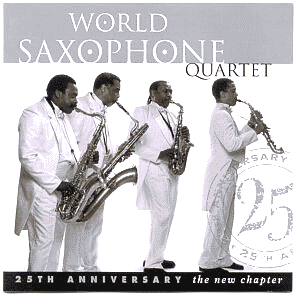WORLD SAXOPHONE QUARTET
25th Anniversary. The New Chapter.
 Justin Time Just
149-2
Justin Time Just
149-2
Crotchet

Listening to this album, it is difficult to believe that the World Saxophone
Quartet has been producing music for a quarter of a century. It has the freshness
and vitality one would expect from recent arrivals rather than seasoned
campaigners like Bluiett, Lake and Murray.
It is also difficult to think back twenty-five years to a time before the
WSQ, such is the extent that they have changed the landscape. They were the
first sax quartet and have remained the best. They have spawned many imitators
(Academia SQ, Apollo SQ, Billy Tipton Memorial SQ, British SQ, Great Circle
SQ, Hard Bop SQ, Jazz Composers Alliance SQ, New York SQ, The Osland SQ,
Pink Noise SQ, Prism SQ, Royal City SQ, ROVA, 29th Street SQ,
Windmill SQ, Your Neighbourhood SQ, to name but a few!) but no equals.
No other sax quartet has consistently produced such stimulating, innovative
and entertaining music. And, yes, entertainment is a vital ingredient of
their music. Despite their roots in the New York avant-garde loft scene of
the 70s, WSQ have never been purists or ideologues. They have embraced the
jazz tradition and can swing as hard as anyone, as demonstrated by fine tribute
albums to Duke Ellington and Miles Davis, and their albums recorded with
African singers, drums and percussionists. On occasions they have recorded
with a full rhythm section, but they can make just the four horns swing.
Of course, they have never lost sight of their avant-garde roots, and can
blow as wild and free as anyone.
One of the keys to their success is that all four members write for the group,
and their contrasting compositional styles provide plenty of variety. In
their early years, Julius Hemphill was the main composer but never the sole
composer. All four original members were strong personalities who were leaders
in their own right. (To date, John Purcell - who eventually replaced Julius
Hemphill after his departure in 1990 - has not recorded as a leader, but
he is younger and has an impressive track record as a sideman. And he does
compose for the group.) Such activities have never taken second place to
the WSQ, in fact they feed ideas and compositions into the group, keeping
its music fresh and evolving.
This album features just the four saxophones unaugmented. It opens with Suki
Suki Now, a David Murray piece that is also on his own new album. Like
several Murray pieces, it has its origins in r'n'b, and makes for a rousing
introduction. After two more reflective pieces, one by Oliver Lake, one by
Hamiet Bluiett, comes an arrangement of the traditional Goin' Home
(also used as the Largo in Dvorak's New World Symphony) that is reminiscent
of similar pieces such as Amazing Grace on David Murray's "Spirituals"
album. Its evocatively mournful melody contrasts with some of the freest
blowing on the album. Fittingly, the album closes with John Purcell's The
New Chapter, which looks forwards not backwards. Over twelve minutes
long, at times it seems to have pretensions to be a tone poem. However, these
never overwhelm the inherently joyful (and funky) playing. The piece features
the quartet's first use of overdubbing, giving the effect of a large horn
section over which individual voices improvise. The piece must be counted
an interesting and effective experiment that lays the foundations for future
exploration. Indeed, not a bad way to be after twenty five years.
John Eyles
D.S. is a professional reed player and teacher living in
Coventry.